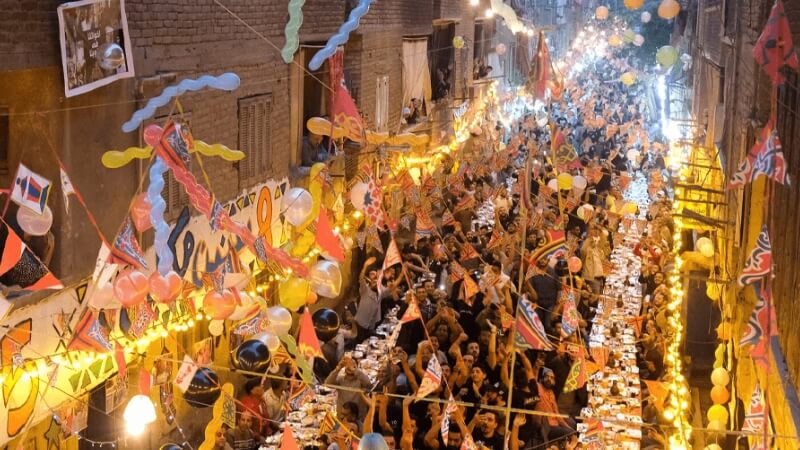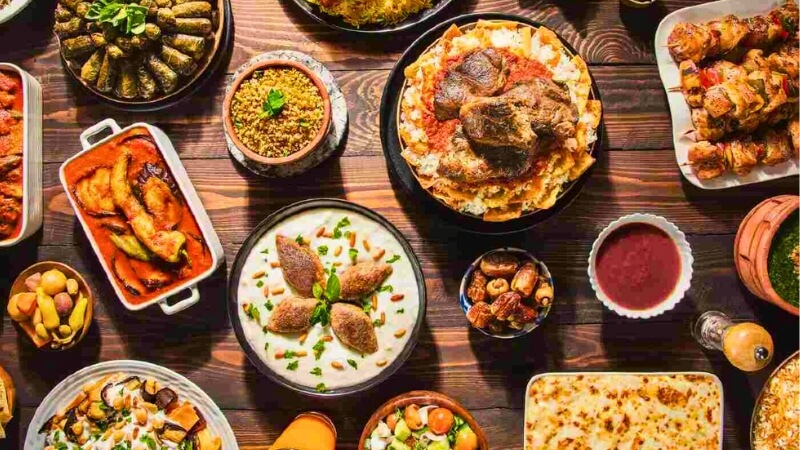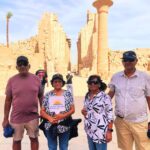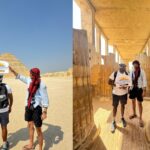Ever wondered what it’s like to experience Ramadan in the heart of Cairo? Imagine streets glowing with lanterns, the sound of prayers filling the night, and tables full of delicious Egyptian food. Ramadan vibes in Egypt are unlike anywhere else. The country’s rich culture and traditions shine brightly during this time.
Ramadan in Egypt brings a special energy. The country lights up with vibrant colors and deep spirituality. You can soak up the local vibe, try traditional foods, and see historic sites.
This guide will help you understand Egypt during Ramadan. You’ll learn about customs and practices. Get ready to make the most of your time in this amazing country.
Ready to experience Ramadan in Egypt for yourself? Discover our best Egypt travel deals and start planning your unforgettable journey today!
Understanding Ramadan in Egypt
In Egypt, Ramadan is more than just fasting. It’s a time of cultural joy and spiritual renewal. Fasting is a key part of Islam and is required for Muslims. It means not eating or drinking from dawn till sunset.
During Ramadan, Egyptians unite in community. The air buzzes with spirituality as people share iftar and suhoor. The streets shine with lights, and the smell of traditional foods fills the air.
Ramadan in Egypt is steeped in tradition. It’s a month for family, charity, and reflection. Egyptians are proud of their fasting and cultural practices passed down through generations.
Some important fasting traditions include:
- Abstaining from food and drink from dawn to sunset
- Gathering with family and friends for iftar and suhoor
- Engaging in charitable acts and giving to those in need
- Participating in Tarawih prayers, special prayers during Ramadan
Learning about Ramadan in Egypt will make your experience richer. Whether you’re a Muslim or a traveler, Ramadan in Egypt is a unique and memorable journey.

When to Experience Ramadan: Dates and Timing
Ramadan’s timing changes every year because of the Islamic lunar calendar. This calendar follows the moon’s cycles. So, Ramadan’s start and end dates move each year on our calendar.
To experience Ramadan in Egypt, it is essential to understand the Islamic calendar. It’s about 11 days shorter than our solar year. This means Ramadan can start as early as February or as late as March in 2026.
Key Dates to Know:
- The start of Ramadan, marked by the first sighting of the crescent moon.
- The end of Ramadan, celebrated as Eid al-Fitr, a significant festive occasion.
- For 2026, Ramadan is expected to start on February 17 and end on Mar 19.
Ramadan in Egypt is full of life and joy. The month gets more festive as it goes on. The start and end of Ramadan are big deals, with Eid al-Fitr being a big highlight.
Visitors get to see Egypt’s rich culture and traditions during Ramadan. It’s a unique and unforgettable experience.
Preparing for Your Ramadan Visit to Egypt
Visiting Egypt during Ramadan is a special experience. You’ll see vibrant cultural events, taste delicious food, and feel the community spirit.
Dressing modestly is key when in Egypt during Ramadan. Men and women should wear clothes that cover their shoulders and knees. This shows respect for the local culture.
It’s important to be considerate of fasting locals. Avoid eating and drinking in public during the day. This is to respect those who are fasting.
- Eat at hotels or restaurants that cater to non-fasting individuals.
- Stay hydrated by drinking plenty of water during Suhoor and Iftar.
- Be patient and understanding if you encounter locals who may be fasting or observing Ramadan traditions.
When it comes to Egyptian Ramadan food, you’ll find many tasty dishes. Traditional Egyptian cuisine includes Koshari, Ful Medames, and Ta’ameyya (Egyptian falafel).
Trying these local specialties during Iftar and Suhoor is a big part of the Ramadan experience in Egypt. Don’t be afraid to try new foods and drinks. And always respect local customs and traditions.
Egyptian Ramadan Traditions and Cultural Customs
As you dive into Ramadan in Egypt, you’ll find a rich cultural heritage. The air is filled with the sweet scent of traditional desserts. The sound of Tarawih prayers echoes through the streets, creating a unique atmosphere.
Egyptian Ramadan traditions are deeply rooted in history and Islamic faith. Homes, streets, and mosques are decorated with colorful lanterns, known as fanous. These lanterns symbolize the light of guidance. You can see this by visiting historical mosques in Egypt, like the Mosque of Muhammad Ali, which is stunning during Ramadan.
During Ramadan, Egyptians share Iftar meals with family and friends. These meals are a culinary journey through Egyptian cuisine. You’ll find dishes like koshari, ta’ameya (Egyptian falafel), and sweet pastries. The sense of community is strong as people gather to share food and company.
Unique Customs and Practices
- Visiting historical mosques to perform Tarawih prayers
- Participating in or watching traditional Egyptian folk performances during Ramadan
- Enjoying traditional Egyptian desserts like kunafah and qatayef
These customs and practices are key to Egyptian Ramadan traditions. They show the country’s rich cultural heritage. Exploring these traditions helps you understand Ramadan’s significance in Egypt and the values of community, hospitality, and spirituality.
By embracing these cultural customs, you’ll have a more authentic Ramadan experience in Egypt. Whether it’s through Iftar meals, visiting mosques, or just soaking up the atmosphere, Ramadan’s spirit in Egypt is unforgettable.
The Culinary Journey: Egyptian Iftar Dishes and Suhoor Specialties
During Ramadan, Egypt’s food scene shines with iftar and suhoor dishes. These meals are both tasty and full of cultural history. You’ll get to try many traditional dishes.
Iftar is the meal that breaks the fast. Egyptian food has many special dishes for this time. Some dishes you should not miss include:
- Fattah: A hearty mix of rice, bread, and meat, topped with tangy tomato sauce.
- Koshari: A vegetarian favorite, with pasta, lentils, tomato sauce, and fried onions.
- Shawarma: A street food favorite, with grilled meat, veggies, and tahini sauce in a pita.
Suhoor, eaten before dawn, gives energy for fasting. Some suhoor treats you might like are:
- Ful Medames: A simple dish of fava beans, garlic, and lemon juice.
- Umm Ali: A traditional dessert, with puff pastry, milk, and nuts.
- Baladi Bread: A common Egyptian bread, often with cheese, jam, or olives.
Egyptian Ramadan food is more than just eating. It’s about sharing and kindness. You’ll see big iftar tables and feel the Egyptians’ warm welcome.
Exploring Egypt’s Ramadan food, you’ll see its rich history is key to the holiday. Try the special dishes and drinks of this month.

Sweet Celebrations: Famous Egyptian Ramadan Desserts
Egyptian Ramadan desserts are a big part of the holy month. They show off the country’s rich food culture. Families and friends come together to enjoy these sweets during iftar.
Some of the most famous Egyptian Ramadan desserts include:
- Kunafa: A dessert made with shredded phyllo dough, cheese, and syrup, kunafa is a favorite during Ramadan.
- Basbousa: This semolina cake soaked in syrup is a staple in Egyptian bakeries and homes during the holy month.
- Umm Ali: A traditional Egyptian dessert made with puff pastry, milk, and nuts, Umm Ali is a rich and creamy treat.
These desserts are not just tasty; they also have deep cultural and social meaning. During Ramadan, making and sharing these sweets brings people together. It creates a sense of unity and joy.
Making these desserts is a family tradition. Recipes are passed down through generations. The process is a labor of love, with each dessert needing careful attention.
When you experience Ramadan in Egypt, try these famous desserts. Whether it’s kunafa, basbousa, or Umm Ali, each bite is a taste of Egyptian hospitality and tradition.
Spiritual Experience: Tarawih Prayers and Mosque Visits
Egypt’s mosques shine during Ramadan with Tarawih prayers. This creates a deep spiritual atmosphere. Joining in Tarawih prayers can be a moving experience. These prayers, held after the evening prayer, draw big crowds to mosques nationwide.
Many mosques in Egypt host Tarawih prayers. Some are famous for their history or the size of their gatherings. For example, Cairo’s mosques, like the Mosque of Muhammad Ali, Al-Azhar Mosque, and Ibn Tulun Mosque, are very popular. They attract thousands of people for Tarawih prayers.
Planning to visit Egypt during Ramadan? Here are some tips for Tarawih prayers and mosque visits:
- Dress modestly when visiting mosques.
- Be prepared for large crowds, specially in major mosques.
- Take a moment to appreciate the architecture and historical significance of the mosques you visit.
Tarawih prayers are more than just a religious act. They are a time for community. As you join or watch these prayers, you’ll see the unity and spirituality of Ramadan in Egypt.
Visiting mosques during Ramadan gives a peek into Egyptian culture and Islamic traditions. You’ll see mosques lit up beautifully, adding to the evening’s spiritual feel.
Key Mosques to Visit:
- Mosque of Muhammad Ali
- Al-Azhar Mosque
- Ibn Tulun Mosque
Ramadan Events and Nightlife in Egypt
Ramadan nights in Egypt are full of energy, color, and celebration. After Iftar, the streets come alive with music, lights, and the sound of people gathering to enjoy the festive atmosphere. One of the best places to experience this is Al-Moez Street in Cairo, a historic street that transforms into a cultural hub during Ramadan. It’s beautifully lit with lanterns, and you can enjoy live performances, traditional music, and delicious street food.
Another highlight of Ramadan nights in Egypt are the Ramadan tents, known locally as “Khayamiya.” These are large, beautifully decorated tents set up in hotels, clubs, and public spaces where people gather after Iftar. They serve traditional drinks, offer live entertainment like music and storytelling, and are a great place to relax and socialize until Suhoor.
Popular Ramadan Night Activities:
Visit Al-Moez Street: Explore historic Cairo at night, enjoy cultural performances, and shop for souvenirs.
Experience a Ramadan Tent: Try local desserts, sip on qamar al-din (apricot drink), and enjoy live music.
Attend Cultural Shows: Some cultural centers host Sufi dance shows (Tanoura), storytelling nights, and concerts.
Explore Night Markets: Cairo’s Khan El Khalili market stays lively late into the night, making it perfect for evening shopping.
These events provide an opportunity to experience Egypt’s vibrant community spirit and rich cultural traditions. Whether you want to enjoy live music, taste special Ramadan treats, or simply take in the festive lights, Ramadan nights in Egypt are an unforgettable part of the holy month.
Navigating Egyptian Cities During the Holy Month
Egypt’s cities change a lot during Ramadan. They mix spirituality with fun. You’ll see that many places open later, but the fun never stops.
Exploring these cities, you’ll find lots of cultural events. Ramadan events include music, dances, and exhibitions. In Cairo, the historic mosques and landmarks buzz with life.
It’s key to know the local ways during Ramadan. Restaurants and cafes close during the day. But at Iftar, they open up with tasty Egyptian food. You can also join in Ramadan activities in Egypt, like Tarawih prayers or market visits.
Here are some tips for exploring Egyptian cities during Ramadan:
- Be ready for shops and restaurants to close during the day.
- Enjoy the buzz at Iftar and Suhoor.
- Check out local events and activities, like cultural shows and exhibitions.
- Respect local customs, dress modestly, and don’t eat in public during the day.
Knowing these tips will help you enjoy Egypt during Ramadan. You’ll dive into the unique cultural and spiritual vibe of the holy month.
As you wander, Ramadan events in Cairo are a highlight. Many historic spots and mosques host special events. Egypt’s cities in Ramadan offer something for everyone, whether you’re into history, culture, or spirituality.
Conclusion: Embracing the Ramadan Spirit in Egypt
Ramadan in Egypt is a unique and enriching experience. It combines spirituality, culture, and community. As you fast during Ramadan in Egypt, you’ll dive into local traditions and customs.
The Ramadan prayers in Egypt are serene. The nightly Ramadan celebrations in Egypt are vibrant. Every moment is a chance to connect with the local culture and community.
By embracing the Ramadan spirit in Egypt, you’ll find peace and tranquility. This experience will give you unforgettable memories and a deeper understanding of local culture and traditions.




